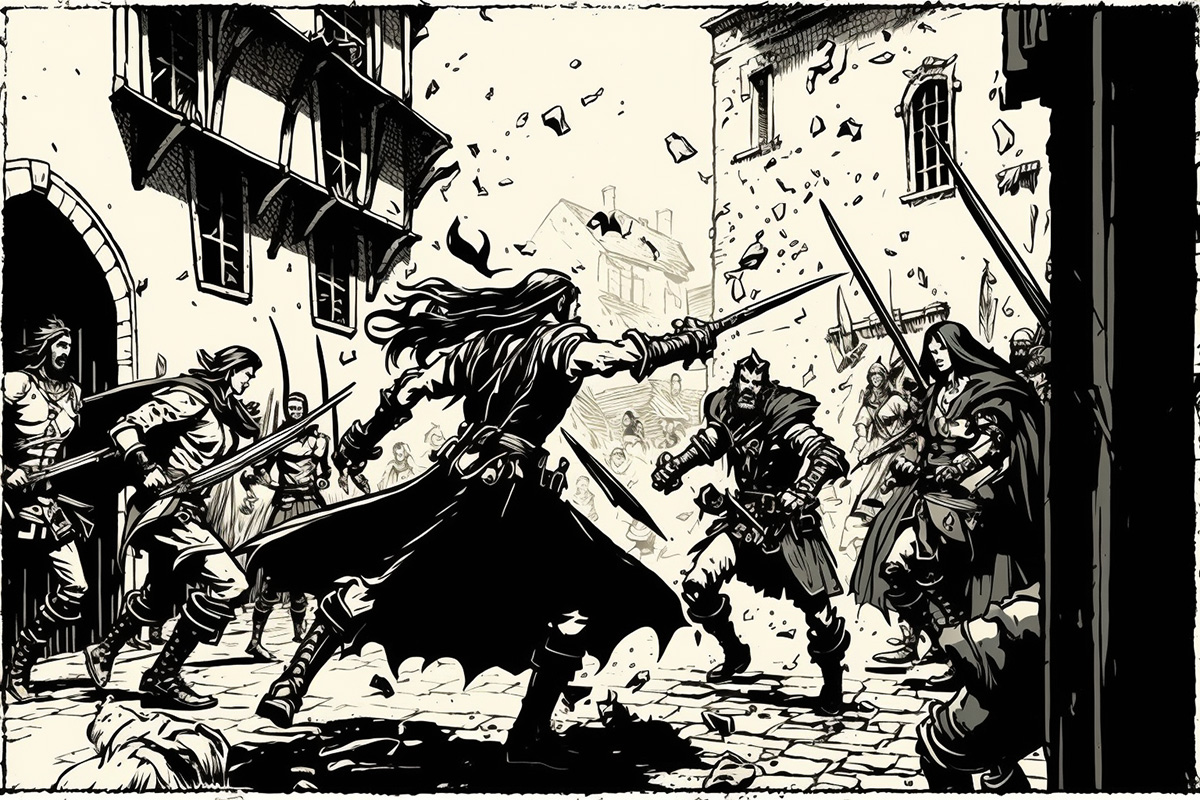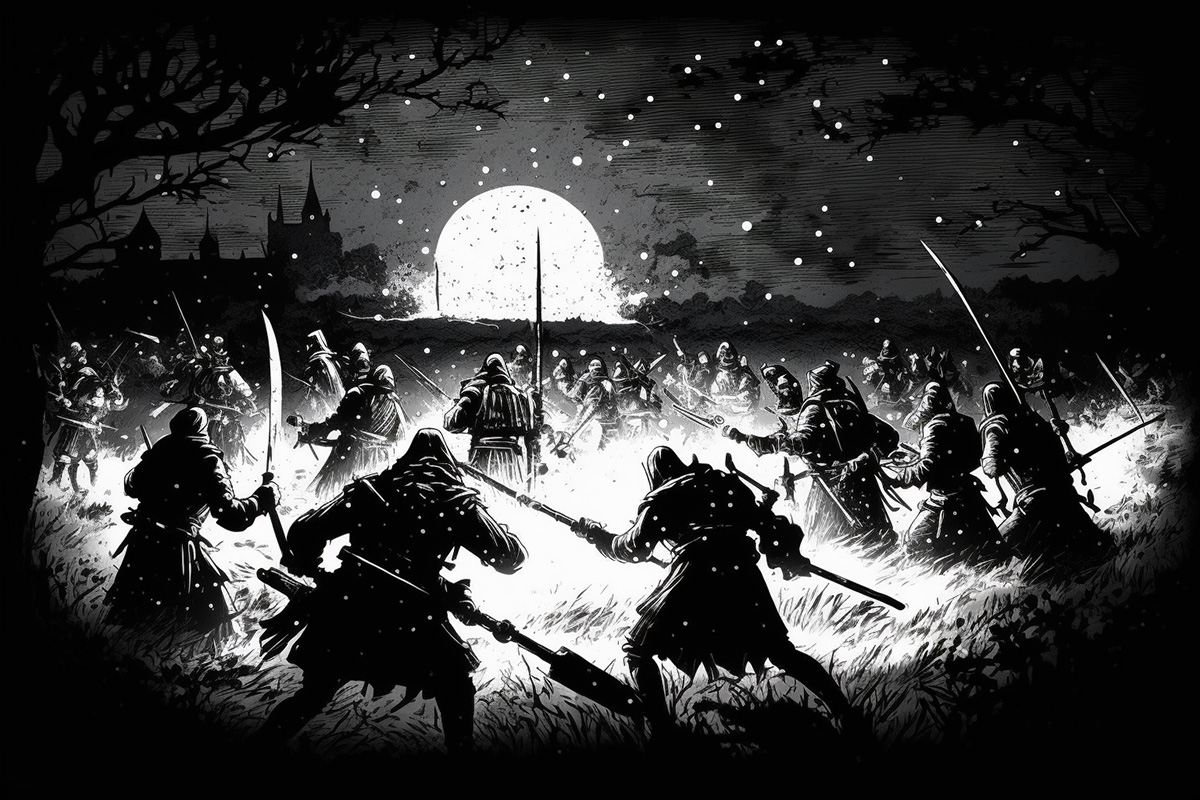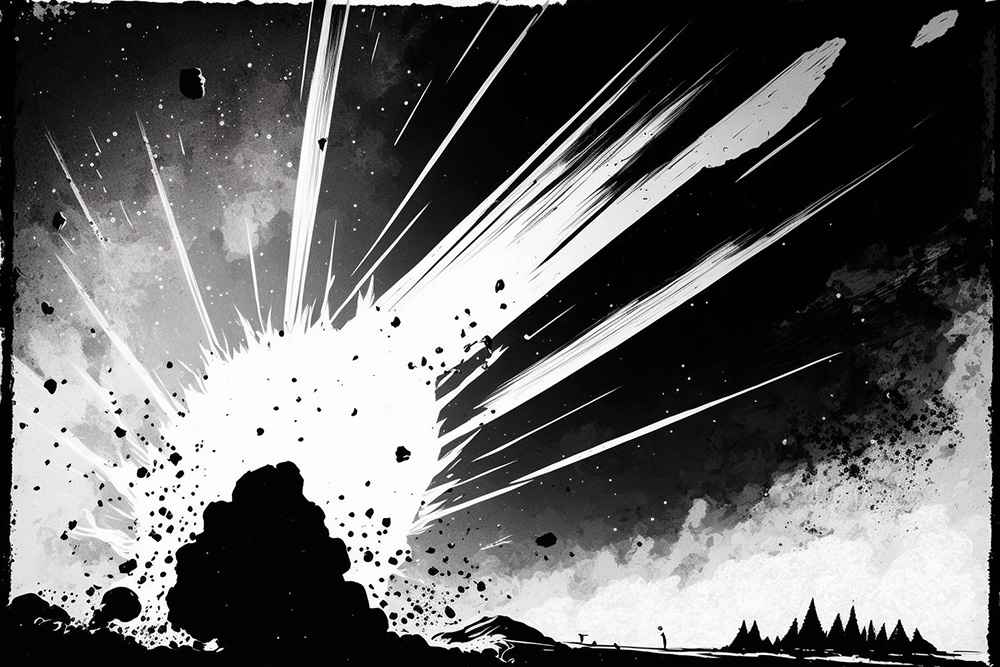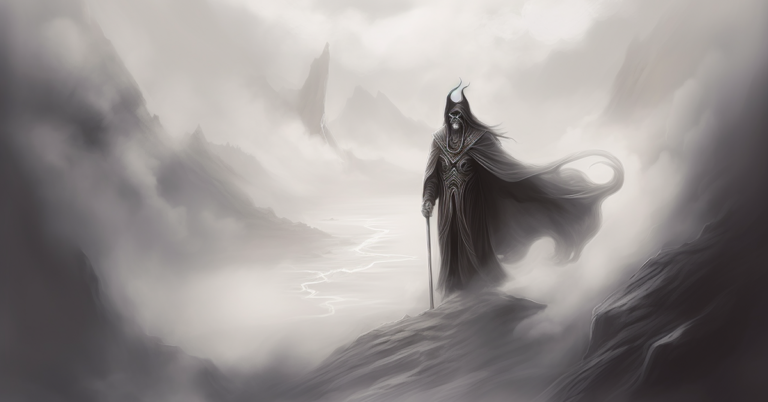In my humble opinion, the Blink spell is massively underused by most players in DnD 5e. I absolutely adore it, especially with my Bladesinging, melee Wizard build. Blink allows me to get right into the front line with my party and have a 50% chance of effectively becoming completely unhittable for the enemy’s round of combat, before appearing back on the field of combat and continuing the attack. Fantastic stuff, I highly recommend Blinking (and blinking, of course).
Short on time? Watch our Blink spell pros and cons web story.
Table of Contents
Blink spell overview
| Name | Blink |
| Level | 3rd |
| School of magic | Transmutation |
| Range | Self |
| Target | Self |
| Components | V S |
| Casting time | 1 action |
| Duration | 1 minute |
| Concentration | No |
| Classes | Wizard, Sorcerer |
Rules as written: Roll a d20 at the end of each of your turns for the duration of the spell. On a roll of 11 or higher, you vanish from your current plane of existence and appear in the Ethereal Plane (the spell fails and the casting is wasted if you were already on that plane). At the start of your next turn, and when the spell ends if you are on the Ethereal Plane, you return to an unoccupied space of your choice that you can see within 10 feet of the space you vanished from. If no unoccupied space is available within that range, you appear in the nearest unoccupied space (chosen at random if more than one space is equally near). You can dismiss this spell as an action.
While on the Ethereal Plane, you can see and hear the plane you originated from, which is cast in shades of gray, and you can’t see anything there more than 60 feet away. You can only affect and be affected by other creatures on the Ethereal Plane. Creatures that aren’t there can’t perceive you or interact with you, unless they have the ability to do so.
What does the Blink spell do in 5e?
The Blink spell, at its core, allows the caster a chance to phase between the Material Plane and the Ethereal Plane in quick succession at the start and end of their turn respectively, making it seem like they are “blinking” in and out of reality.
Blinking to the Ethereal Plane
For Material Plane lubbers that have not made the trip before, the Ethereal Plane is part of the DnD multiverse; a misty, fog-bound dimension that exists alongside the Material Plane, often described as a place of ghosts and spirits. When using the Blink spell, the caster doesn’t fully travel to the Ethereal Plane in the traditional sense. Instead, they exist on the border, in a transitional space between the two planes, which makes them invisible and intangible to those in the Material Plane (where presumably, combat and disemboweling are taking place that you’re trying to avoid).

Duration and consistency
The Blink spell lasts for one minute, and its effects aren’t consistent. At the end of each of the caster’s turns, there’s a 50% chance they’ll disappear from the Material Plane and reappear in the Ethereal Plane until the start of their next turn. This unpredictability is both a boon and a challenge, offering protection but also introducing an element of randomness to the caster’s positioning.
It’s important to note that the spell specifically takes you to the Ethereal Plane at the end of your turn and takes you back at the start of the next turn, meaning you cannot perform actions on the Ethereal Plane.
In essence, the Blink spell offers a tantalising blend of protection and unpredictability, challenging players to adapt on the fly and use its mechanics to their advantage. Whether you’re using it to avoid a deadly blow or position yourself strategically, Blink is a tool of immense potential in the hands of a creative spellcaster.
How does the Blink spell work?
The Blink spell is self-targeted, meaning it only affects the caster, it requires verbal and somatic components and lasts 1 minute. Given the length of a combat round (6 seconds), this means it could potentially activate up to 10 times during its duration.
Initiation
Upon casting: the spell immediately takes effect, but the caster doesn’t automatically blink out. The phasing in and out begins at the end of the caster’s turn.
End-of-turn phase: At the end of the caster’s turn, they roll a d20. On a roll of 11 or higher, they vanish from the Material Plane and appear in the Ethereal Plane.
Start-of-Turn phase: At the beginning of the caster’s next turn, they return to an unoccupied space of their choice that they can see within 10 feet of the spot they vanished from. If no such space is available, they appear in the nearest unoccupied space.
Randomness: The spell doesn’t guarantee a blink on every turn. There’s always a 50% chance of phasing, adding an element of unpredictability.
Planar Transition
Ethereal sight: While on the Ethereal Plane, the caster can only see and hear the plane they originated from, which is cast in shades of gray and is somewhat muted and limited to 60ft. They can’t interact with it or affect it in any way until they return.
Interactions on the Ethereal Plane: Creatures that aren’t on the Ethereal Plane can’t perceive the caster and can’t interact with them.
Safety Mechanisms
End of spell duration: If the caster is on the Ethereal Plane when the spell ends, they immediately return to the Material Plane.
Environmental considerations: The spell doesn’t account for environmental changes. If the space where the caster blinked out is now occupied (for instance, by a wall of fire or an incoming boulder), they’ll have to find a safe spot within 10 feet or suffer the consequences.
Blink, with its interplay of chance and strategy, challenges both the player and their adversaries. Mastering the spell requires not just an understanding of its mechanics, but also the ability to think on one’s feet and adapt to its unpredictable nature. This dance between realms, if wielded adeptly, can turn the tide of an encounter.
What are the odds of the Blink spell not working?
Each round, there is a 50% chance of the caster blinking into the Ethereal Plane, so what are the odds of casting Blink and this never happening?
| Round number | Consecutive chance of not blinking |
| 1 | 50% |
| 2 | 25% |
| 3 | 12.5% |
| 4 | 6% |
| 5 | 3% |
| 6 | 1.5% |
| 7 | 0.8% |
| 8 | 0.4% |
| 9 | 0.2% |
| 10 | 0.1% |
This means there is a 1 in 1,000 chance (0.1%) that you could cast Blink and it effectively fails 10 times in a row.

What can Blink be used for in 5e?
The Blink spell, while primarily seen as a defensive mechanism, has a multitude of applications that can be harnessed by innovative players. These range from combat strategies to exploration utilities and even narrative-driven uses.
Avoiding damage: The most straightforward use of Blink is to avoid taking damage. By phasing into the Ethereal Plane, a caster can make themselves immune to attacks, spells, and other harmful effects originating from the Material Plane.
Evading Enemies: Beyond just avoiding damage, Blink can be used to avoid being even targeted by spells such as Charm, Sleep, Blind, and the like. The randomness of the spell can also throw off enemies, making it hard for them to anticipate the caster’s location.
Repositioning: Since transitioning between planes with Blink doesn’t provoke opportunity attacks, it’s an effective way to move around the battlefield without risk. This can be particularly useful for spellcasters who find themselves in melee range or those wanting to get closer to or farther from an enemy without repercussion.
Setting up powerful spells: By blinking in and out, a caster can find an optimal position to unleash a devastating area of effect spell, catching foes off-guard.
Bypassing obstacles: Certain physical barriers might not extend into the Ethereal Plane, allowing casters to bypass them while using Blink.
Enhancing roleplay: Creative roleplayers can use Blink to enhance dramatic moments, like disappearing in the middle of a conversation only to reappear moments later as an intimidation tactic.
Blink spell common questions
Can I control when I blink in and out?
No, the Blink spell operates based on chance. At the end of each of your turns, you roll a d20, and on a result of 11 or higher, you transition to the Ethereal Plane. The unpredictability is inherent to the spell.
Can I blink through walls or doors?
The rules state “unoccupied space of your choice that you can see“, so unless you can see the space, you cannot return to it. This means if your target location is obscured by a wall or closed door, unless you have some reason you can see through it, you cannot blink to it.
What happens if I’m in the air when I cast Blink?
The spell doesn’t change your momentum or physical position. If you were falling when you cast the spell and then blink out, you’d continue falling in the Ethereal Plane, and when you blink back, you’d still be subject to whatever consequences that motion entails in the Material Plane (like fall damage).
Can I cast spells while on the Ethereal Plane?
No, the Blink spell specifically takes you to the Ethereal Plane at the end of your turn and takes you back at the start of the next turn, meaning you cannot perform actions on the Ethereal Plane.
What if there’s a barrier or creature where I blinked out when I return?
When returning from the Ethereal Plane, you can choose an unoccupied space within 10 feet of where you disappeared. If no such space exists (due to a wall, creature, or other obstacle), you’ll appear in the nearest unoccupied space.
Do effects or conditions on me continue while I’m in the Ethereal Plane?
Yes, conditions like being poisoned, charmed, or on fire will persist. The Ethereal Plane doesn’t halt these effects; it merely makes you intangible to the Material Plane.
Can I be attacked by creatures native to the Ethereal Plane?
Yes, while on the Ethereal Plane, you’re susceptible to interactions with entities and creatures that reside there. Ghosts, specters, and other ethereal beings can perceive and engage with you.
Does Blink provide any protection against spells or effects that target other planes or dimensions?
Some spells and abilities can affect interdimensional spaces or multiple planes. In such cases, Blink won’t provide protection. Always be aware of enemies with planar abilities.
Can I use Blink to escape bindings or restraints?
Blinking doesn’t free you from physical restraints. If you were tied up or chained in the Material Plane and you blinked out, you’d still be restrained in the Ethereal Plane.
Can I choose to end Blink early?
You can use an action to dismiss the spell and end its actions.
Does the Blink spell require concentration?
No, Blink is not a concentration spell.
Advanced tips and tactics for the Blink spell
For those looking to elevate their use of the Blink spell beyond its basic application, it’s essential to think both creatively and strategically. Here’s a collection of advanced tactics and considerations to make the most of Blink:
Blink with complementary spells
Delayed Blast Fireball: Cast this spell with a delay, then use Blink to ensure you’re safely on the Ethereal Plane when it detonates.
Contingency: Pair this spell with Blink to set up specific triggers. For example, if you’re surrounded by enemies, Blink can activate automatically.

Use Blink to lure enemies away
Enemies will have difficulty strategising against a player who might suddenly disappear. This can be exploited by intentionally placing oneself in risky positions, thereby tempting enemies into traps or luring them away from objectives.
Environmental considerations for Blink
If a teammate can reliably generate difficult terrain or AoE (area of effect) spells, use Blink to safely navigate or bypass these hazards. Signal teammates about your Blink intentions, allowing them to adjust their strategies accordingly.
Some terrains or scenarios might be particularly advantageous for Blink users. For instance, in a maze or labyrinth, unpredictably phasing in and out can frustrate pursuers and allow for a quick escape.
Use vertical environments to your advantage. Blink can be a lifesaver when fighting on precarious ledges or cliffs.
Roleplaying with Blink
Use Blink to play mind games with NPCs. For instance, disappearing mid-conversation or during an intimidation attempt can be a powerful psychological tool. The beauty of the Blink spell, like many aspects of D&D, lies in its potential for creativity. While its fundamental mechanics are straightforward, the myriad ways players can exploit, adapt, and weave it into their strategies make it a spell worth mastering. The above tips are merely a starting point, and as always, the real magic emerges from players’ imaginations and in-game decisions.
Downsides to the Blink spell
You’re probably pretty sold on taking the Blink spell now, right? Blinking in and out of the Material Plane is hugely powerful, but the lack of control also means this spell can land you in some suboptimal situations.
Not being able to be helped or healed
As Blink is not a concentration spell, this means your chance of blinking in and out of the material plane is going to continue even when you’re conscious. If your caster gets downed, they’ll have to roll their death save on their turn, only to blink back into the Ethereal Plane before one of your allies can come to help you. It does of course though, stop intelligent creatures from attacking you when you’re unconscious.
The same will of course apply to healing. Allies who want to heal you on their turn, either through a direct action of Area of Effect spells won’t be able to if you have uncontrollably blinked out of the Material Plane!

Not being around for reactions
While being on the Ethereal Plane means you’re safe, it also means you’re not there for your party. Imagine the enemy Wizard casting a devastating spell that you would have been able to prevent if only you were there with your Counterspell! Unfortunately, you were kicking back on the Ethereal Plane, unable to render any kind of assistance. Not really a team player move of you.
Missing out on party buffs and effects
You can’t have Haste cast on you if you’re not there. You can’t enjoy the benefits of Bardic Inspiration (“You can only affect and be affected by other creatures on the Ethereal Plane.”), if you’re not there. You get the idea. You’re not there.
Expensive spell slot
Blink uses a 3rd level spell slot, which makes it potentially expensive as other powerful spells could be used that arguably have a greater effect.
Is Blink a good spell?
Let’s summarise what we’ve covered so far:
Advantages of the Blink spell
- Massively increases the survivability of the caster
- Can make the caster immune to physical damage
- Can make the caster non-targetable by enemy spells
- Allows for repositioning without attacks of opportunity
- Provides an escape route and setup for other delayed action spells
- Does not require concentration
Disadvantages of the Blink spell
- Requires a 3rd-level spell slot
- Randomness
- Continues if unconscious and in need of aid, potentially increasing the chance of death
- Can stop the caster using reactions such as Counterspell
- Potentially prevents receiving buffs from allies
In summary, Blink is a great choice for players who want to improve their survivability and perhaps have other casters in the party to fill the brief gaps when they’re “not about” or have more offensive casting abilities. As it’s a 3rd-level spell, you are potentially sacrificing spells such as Counterspell, Fireball, Haste, and Stinking Cloud, all of which are potentially devastating to the enemy.
I personally think Blink is a particularly good choice for Wizards using Bladesinging, as it reduces their chances of being hit in melee combat while allowing them still to use their concentration on another spell such as Shadow Blade.
